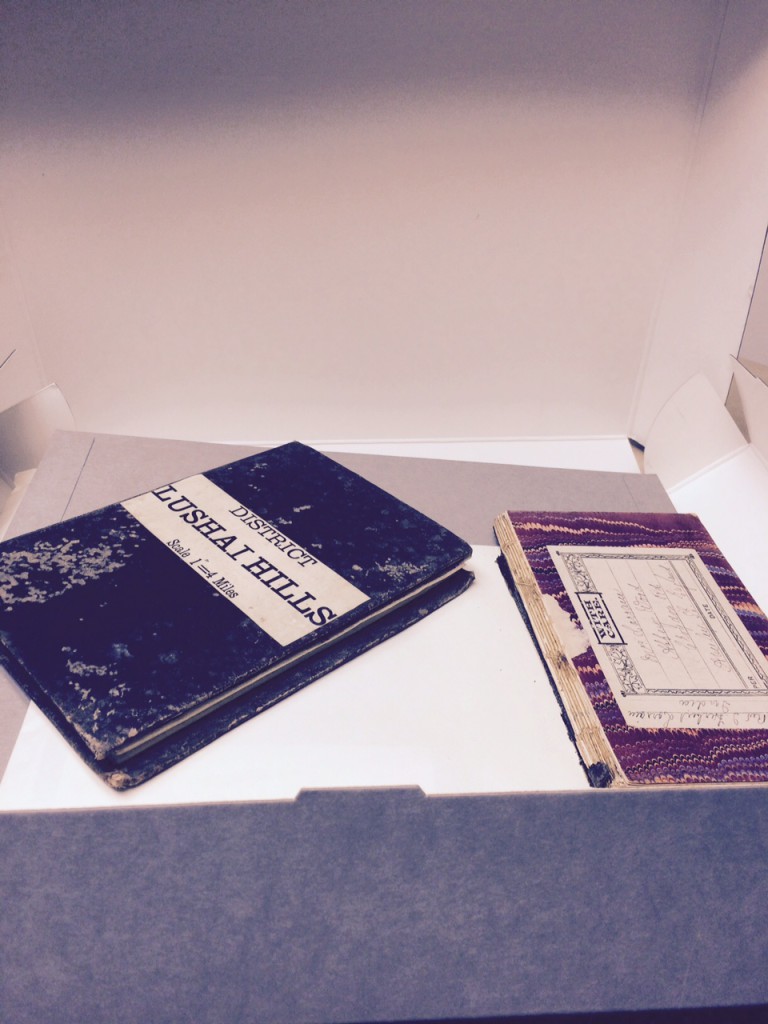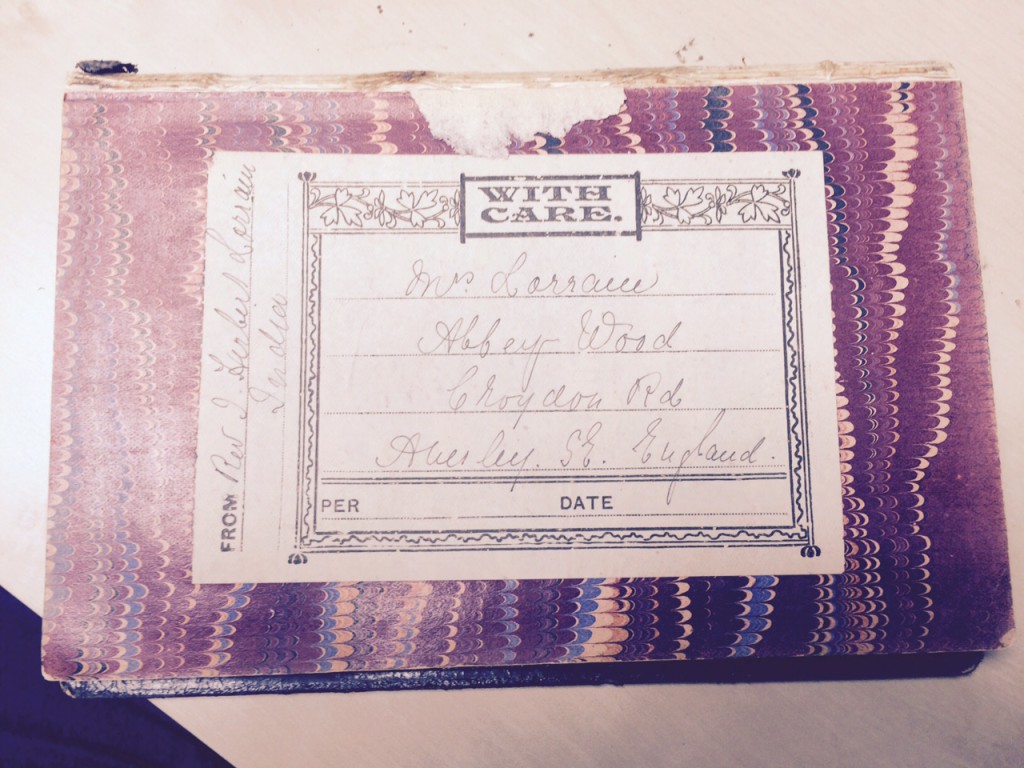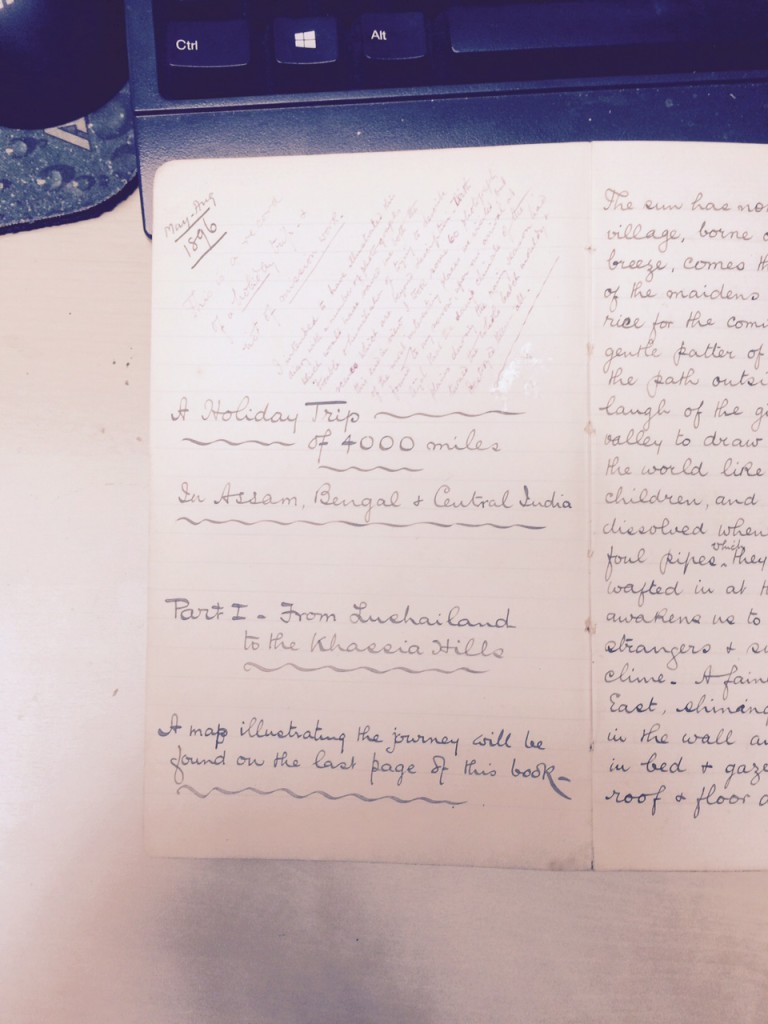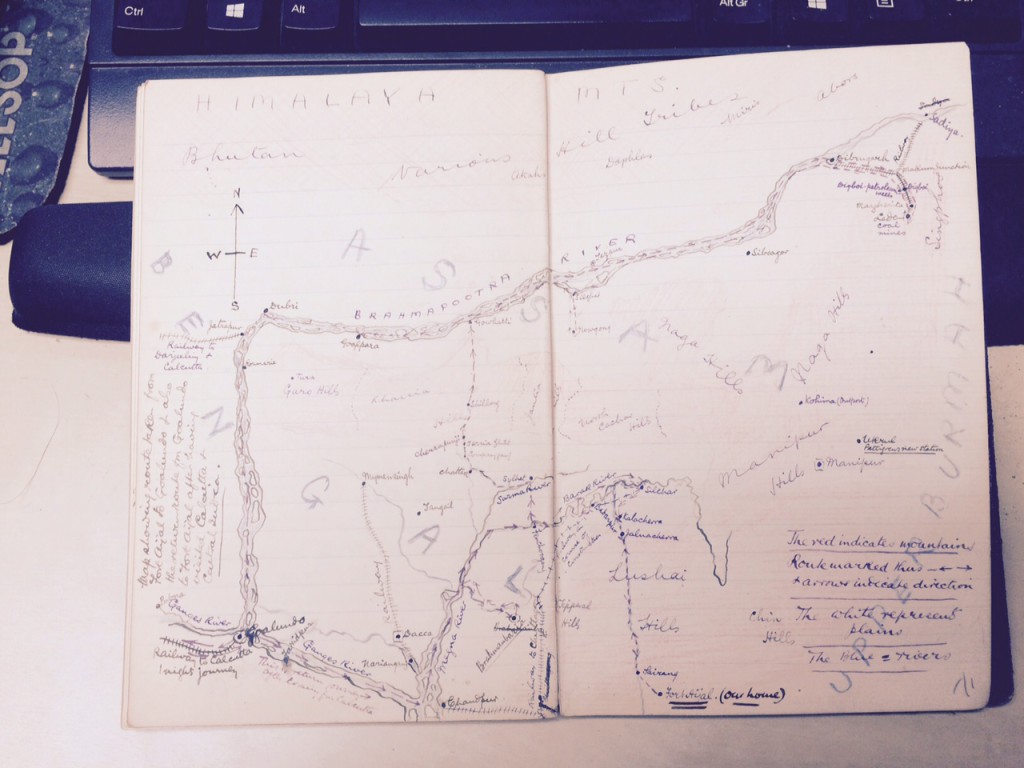Hidden treasure
Posted Friday, 24th July 2015
Seeing as I have now been in post for three weeks, I thought it about time that I write a blog post to replace the advertisement for my position. My first three weeks at the Angus have been wonderful. The team has been incredibly welcoming and I delight daily at all the wonderful items we have in the archives. I have a huge interest in social history and we certainly have a very large amount of documents which can be read to feed this interest. As the HLF-funded project I am working on here at the Angus is called Hidden Treasures, this is the short story of my first discovery of a hidden treasure from the archives.

A reader came in on Monday researching missionaries in the Lushai Hills (now Mizoram), India, for his PhD. As I was putting the boxes back into the stack, I decided to have a quick peek into one of them. I was immediately drawn to one of the small notebooks and started to read. This diary, written by Mrs Lorraine, tells the story of a holiday she took with her husband between May and August 1896. I hope you enjoy this as much as I have.

I now hand over to Mrs Lorraine…

“The sun has not yet risen. From the village, borne on the gentle morning breeze, comes the monotonous thud, thud of the maidens pounding the household rice for the coming day, presently the gentle patter of bare feet is heard on the path outside and the silvery laugh of the girls as they go to the valley to draw water, sounds for all the world like that of happy English children, and the illusion is only dissolved when the smell of foul pipes which they are smoking is wafted in at the window and fully awakens us to the fact that we are strangers & sojourners in a foreign clime. A faint light appears in the East, shining through the cracks in the wall and as we turn over in bed & gaze upon the bamboo roof & floor and walls which it reveals, all dreams of the homeland which may have blessed our sleeping hours, vanish, and with something which sounds very much like a sigh, we slip from under our mosquito net & commence the process of washing and dressing. While this is in progress, the back door is opened by a little native boy, who slips in & spreads the table for the early morning meal, which ready, he opens the front door by carrying it away bodily to the other end of the verandah & props up the flaps which serve as shutters to the unglazed lattice windows, and lets in the light of the sun which has just risen. As we sip our tea we converse upon the approaching journey & wonder if the men & women who last night so faithfully promised to carry down our luggage to the river, will at the last moment back out of their contract. Through the open door we catch a glimpse of one or two of them coming up the path to test the weight of the various packages which litter the verandah. This we must not allow as experience has taught us that if they lift even the light loads from the ground with their hands the imagine that they are too heavy for them to carry; whereas if we lift them ourselves & put them on their backs so as to rest on the strap which passes across their forehead they carry them off quite happily without grumbling at the weight. Two or three bearers are got off in this way and by & by others come up & before long the verandah is clear & only one or two women remain behind to carry down the pots and pans which at present moment are being used in the cook house to prepare our chotahazri – There is now a lull, during which we can have prayers undisturbed, and commit ourselves to Him who is able to take us through all our wanderings safely & bring us back to this little cottage which we call home. There are still a few minutes wanting to eight o’clock so we may as well walk up and down the verandah & look for the last time for many weeks upon the familiar scenes around us. The house is situated upon the very top of a mountain ridge, which slopes down steeply in front to a deep valley, and behind forms a precipice covered with dense forest. From the front verandah, looking eastward the scene is one of peculiar beauty, steep mountain ranges from the most part running N. & S. like the one upon which we stand, rise one behind the other as far as the eye can reach until they are lost in the distance on the Burmese frontier. The valleys between the ranges are filled with clouds, which in the morning light shine like freshly fallen snow & from this sea of dazzling whiteness, thickly wooded peaks and spurs rise like a fairy archipelago. As we watch, a breeze disturbs the even surface of the cloudy sea, & the whole assumes the aspect of an angry ocean, dashing against the rocky islet, submerging some & leaving others high and dry, rushing like a mighty cataract over project spurs, & sending its milk white spray high into the heavens. Then a grand transformation takes place, the clouds influenced by the warm rays of the sun, rise from the valleys, and as they ascend higher & higher they are at last dissolved into invisible vapour, & for the first time we see the well wooded valleys & the precipitous mountain sides covered with their wealth of tropical greenery, broken there & there by the jooms or cultivated patches of the Lushais. If we go around to the back of the house & look westward, a view even prettier than the one upon which we have just been gazing meets our eyes. To the N. & S., on either side of our house a slight indentation in the ridge, forms a natural boundary between our domain & the Lushai villages, into either of which it would not be a difficult matter to throw a stone from our verandah. But we must hurry, for chota hazri is already on the table & we have got a long walk before us. Of course you know that chotahazri means – Chota “small” and hazri “breakfast”. With us it is generally indeed almost invariably, consists of a plate of porridge, an egg & a piece of bread & butter or jam. Perhaps you mistook the other meal which we had at sunrise for chotahazri. That was what is known in Assam as palang cha or “bed tea” because as a rule it is brought to us by one’s bed by the quiet-footed native servant as soon as the dawn begins to break. But we like to get up to have it, as taking it in bed is liable to make one lazy, & anything which tends to this evil must in India be strenuously withstood. A cup of tea at early dawn is in this country a necessity & not a luxury for without it the system is unable to overcome the pernicious influence of the climate, unless indeed one stays in bed until the choto hazri is ready, and loses the best part of the morning. But we must not loiter; the cooking pots, camp stove &c are already being packed into the women’s curiously shaped baskets, and our little Lushai boy Khuma is anxious to start, upon what will be to him a wonderful journey indeed, for he has never been away from his native hills before. A few of his friends I see are entrusting him with money where with to purchase beads when he arrives in the great city of palaces the marvellous “foreign village of Kulkuta” (Calcutta) as the Lushais call it. The other Lushai lad, Lusheia, who is to stop and take care of the house while we are away, looks rather cast down, and evidently reflecting upon the possibility of a repetition of the fearful tornado we had the other day, calmly asks what steps he had better take in case of the house being blown down. Giving him our parting injunctions, which mainly consist of exhortations to keep the books well dusted & to put them out in the sun on fine days, which, by the way, is the only means of keeping them from rotting during the rainy season, we pass from our humble cottage, salute the crowds of friendly Lushais who are at the gate to say farewell, and soon we are on our way…”
 Categories: Uncategorized
Categories: Uncategorized 

Recent Comments